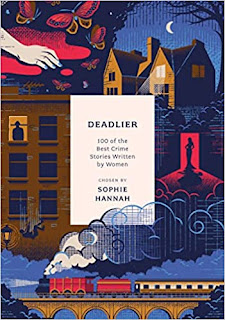A detective
novelist who brilliantly describes backstage life
Ngaio began writing detective novels in 1931 after moving to London to start up an interior decorating business. Stuck in her basement flat on a very wet Saturday afternoon she decided to have a go at writing a detective story and came up with the idea for her sleuth, Roderick Alleyn, a gentleman detective.
She sat down
to write what was to be the first of a series of 32 crime novels featuring Alleyn,
who she named after an Elizabethan actor, Edward Alleyn. Her detective was to work
for the Metropolitan Police in London, even though he is the younger brother of
a baronet.Ngaio Marsh came to be seen as
one of the Queens of Crime
Her second novel, Enter a Murderer, published in 1935, and several others, are set in the world of the theatre, which Ngaio knew well as she was also an actress, director and playwright at times during her life.
After leaving school she had studied painting before joining a touring theatre company. She became a member of an art association in New Zealand and continued to exhibit her paintings with them from the 1920s onwards.
Ngaio allows her detective, Alleyn, to meet and fall in love with an artist, Agatha Troy, in her 1938 novel, Artists in Crime.
She directed many productions of Shakespeare’s plays in New Zealand and Australia and the 430-seat Ngaio Marsh Theatre at the University of Canterbury in New Zealand is named in her honour.
In her 1946 short story, I Can Find My Way Out, which features Alleyn, Ngaio once again uses the theatre as her setting. A new playwright, Anthony Gill, is waiting nervously for the premiere of his first play at The Jupiter Theatre in London.
The female lead, Coralie Bourne, has been kind to him and advised him on his play, but the male lead, Canning Cumberland, is known to have a drinking problem and can be unpredictable, which worries Gill. Two of the other actors also resent Cumberland, one because he was given the best part and the other because he was given the best dressing room.
Meanwhile, Roderick Alleyn and his now wife Troy are entertaining a friend, Lord Michael Lamprey, for dinner. He is keen to join the police but his conversation with Alleyn is constantly interrupted by phone calls that are actually meant for a delivery firm. When one of the callers asks if they can deliver a suitcase to playwright Anthony Gill at the Jupiter Theatre, Lord Michael thinks it would be fun to take the job as he has been unable to get a ticket to see the play.
Before he
reaches the theatre, the case falls open and he discovers a false ginger beard
and moustache, a black hat, a black overcoat with a fur collar and a pair of
black gloves.Sophie Hannah's collection of
stories is published by Apollo
On an impulse Lord Michael puts the whole outfit on and insists on being allowed to deliver the case in person to the playwright backstage.
As Coralie makes one of her exits from the stage, she sees him standing in the wings wearing the beard and black clothes and faints. The male lead, Cumberland, also reacts with horror when he sees him and locks himself in his dressing room.
Lord Michael continues to watch the play from the wings with fascination, although he becomes increasingly aware of the smell of gas. Eventually, he traces the smell to one of the dressing rooms, gains access and drags out the unconscious occupant, but sadly it is too late to save him.
He rings Alleyn and the detective arrives at the theatre with his men, where it does not take him long to discover that one of the actors has been murdered.
In just 18 pages, Ngaio sets up the story, establishes the characters and their relationships, brilliantly describes the dressing rooms, equipment and atmosphere backstage, drawing on her experience of the theatre, and allows Alleyn to solve the crime.
I Can Find My Way Out is among a collection of stories chosen by the author Sophie Hannah entitled Deadlier: 100 of the Best Crime Stories Written by Women. The compilation is also available in hardback.
Along with her fellow Queens of Crime, Margery Allingham, Agatha Christie and Dorothy L Sayers, Ngaio was to dominate the genre of crime fiction from the 1930s onwards with her novels, short stories and plays.
In 1948 Ngaio was appointed an Officer of the Order of the British Empire for services in connection with drama and literature in New Zealand. She became a Dame Commander of the Order of the British Empire for services to the arts in the 1966 Queen’s Birthday Honours.
Ngaio’s autobiography, Black Beech and Honeydew was published in 1965. She was inducted into the Detection Club in 1974 and received the Grand Master Award for lifetime achievement as a detective novelist from the Mystery Writers of America.
Her 32nd and final Alleyn novel, Light Thickens, was completed only a few weeks before her death. The story revolves around one of her greatest theatrical passions, Shakespeare’s play, Macbeth.
Ngaio died in her home town of Christchurch and was buried at the Church of the Holy Innocents, Mount Peel.
The Ngaio Marsh Award is given annually to the writer of the best New Zealand mystery, crime or thriller novel. Her home in Christchurch is now a museum and displays her collection of antiques. On her desk lies her fountain pen filled with green ink, which was her preferred writing tool.
Ngaio Marsh’s 32 Roderick Alleyn crime novels and her collections of short stories are available in a variety of formats from or


No comments:
Post a Comment